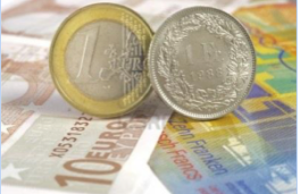The not-so-fun Franc
January 15, 2015
Alright Breezes super readers, fasten your seatbelts and get your thinking caps on, because this article is about to get technical.
On January 15th, to the complete surprise of the world, The Swiss National Bank (SNB) removed their peg of 1.20 Swiss Francs per Euro. Minutes later, the Franc rose about 30% in value against the euro and about 12% on the US dollar. As a result of the largest single day movement in a developed market, large Swiss stocks lost about $100 billion on the currency move. In addition, the European Central Bank (EBC) lost about $40 billion in its own foreign-currency holdings. Houston, we have a problem.
At this point you’re either shocked or you’re just a little bit confused. To the first group: I’m very impressed that you’ve managed to avoid the news for this long. To the second group: Have no fear, I fell into this category when I first read this.
So let’s do some quick math to try and clear up just a few of the implications that this move has had on the global economy.
Scenario: Say for some reason you had one hundred Euros worth of Francs held in a Swiss bank. Before this move, that means you owned about 120 Francs. After the removal of the peg, you now only have 101 Francs. That equates to a loss of about 18 Euros, or $21 US dollars.

Twenty-one dollars? What’s the big deal? Well, most people who have money being held in Swiss banks are holding a bit more than 100 dollars. And if you keep adding zeros, up to tens of billions for some major business ventures, the loss is massive considering it happened in mere seconds.
As far as the global economy goes, this is just another step in the long and ominous downturn that’s been occurring. The Euro is poised to enter its third recession in six years; the world’s second largest economy, China, is slowing; Japan, the third largest, is currently facing its own inflation problems; and the output of major emerging markets that have provided the fuel for global economic growth have begun to drop off sharply. And now, with this currency change to top it all off, the economic future is beginning to look a bit more bleak.
Now you’re probably asking, “but what about the United States?” With a better outlook than the rest of the world, the dollar has been on the rise which has drawn investors to dollar assets. While this could be beneficial, the bottom line is that while the Fed was poised to announce changes in short-term interest rates, Switzerland’s move could change all that. If the Fed were to hold off on the decision, it could potentially overheat the US economy, which could spell trouble. Basically, the global market could be in big trouble coming up. But as usual, it all depends. Stay tuned, folks.































